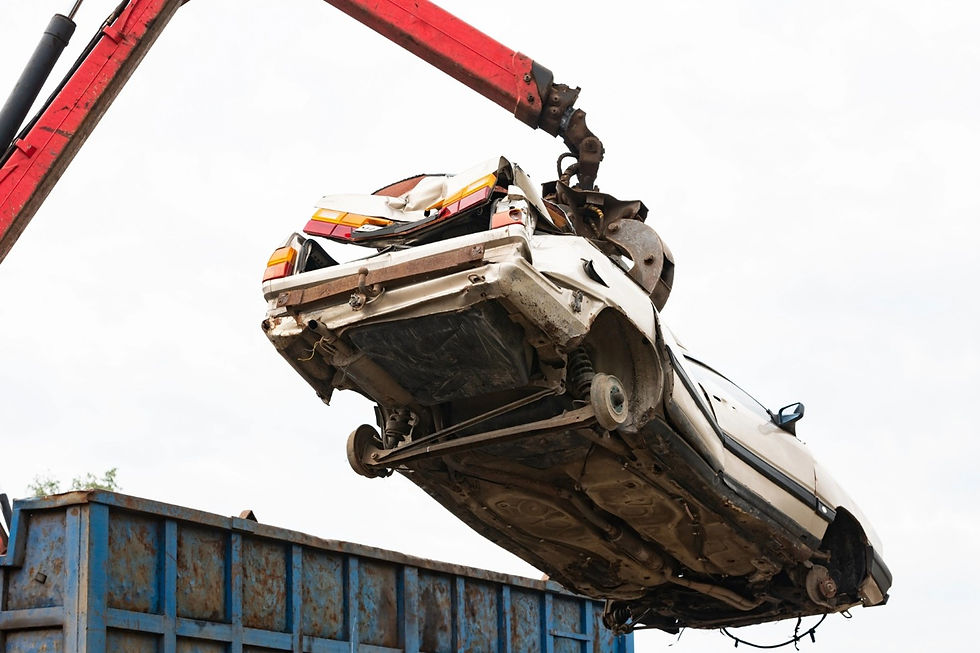What Happens to Your Vehicle at a Scrap Yard in Nelson
- Oct 28, 2025
- 2 min read

When a vehicle reaches the end of its lifespan, it still holds value through its recyclable materials and usable components. At Scrap King Auto Wrecking & Towing Ltd., we aim to provide insight into how our car auto wreckers in Nelson process end-of-life vehicles responsibly. From dismantling to recycling, each stage is designed to ensure that environmental safety and material recovery are properly managed.
Safe Fluid Removal and Environmental Handling
Scrap yards follow strict environmental protocols when dealing with fluids such as fuel, oil, coolant, and transmission fluid. These substances are hazardous and must be handled carefully to prevent contamination.
During this stage:
● All fluids are drained: Automotive fluids are collected using sealed containers to prevent leaks or spills.
● Hazardous materials are managed safely: Batteries, refrigerants, and airbag components are removed according to provincial environmental regulations.
● Recyclable fluids are processed: Some fluids, like antifreeze and motor oil, can be filtered and reused in other applications.
These practices ensure that car auto wreckers maintain environmental compliance while supporting responsible auto recycling and minimizing waste.
What Parts of a Vehicle Are Typically Salvaged or Recycled?
Many vehicle components remain functional even after a car is no longer roadworthy. Commonly salvaged parts include:
● Engines and transmissions: These are often refurbished and sold for use in other vehicles.
● Alternators, starters, and radiators: Mechanical parts that can be cleaned, tested, and resold.
● Doors, mirrors, and glass: Exterior components are removed and reused when in good condition.
● Catalytic converters: These contain precious metals like platinum, palladium, and rhodium that are extracted and recycled.
● Tires and wheels: Usable tires are resold, while damaged ones are recycled into asphalt or other materials.
By recovering these parts, auto wreckers reduce waste and support the automotive circular economy.
How Do Car Scrap Yards in Nelson Handle Environmental Safety?
Environmental responsibility is central to modern automotive recycling. Scrap yards implement eco-conscious procedures to reduce their environmental footprint. These include:
● Recycling metal components: Steel, aluminum, and copper are separated and sent to metal recycling facilities.
● Proper waste disposal: Non-recyclable materials are safely discarded following municipal waste regulations.
● Reducing landfill impact: By recycling up to 80% of a vehicle’s components, auto wreckers help divert substantial waste from landfills.
These measures reflect the commitment of car auto wreckers in Nelson to sustainability while meeting British Columbia’s environmental standards.
Final Processing and Material Recycling
After usable components are removed, the remaining car body—mainly metal—is crushed and transported to a shredding facility. There, the metal is sorted, melted down, and repurposed into new manufacturing materials. This process supports scrap metal recycling, conserves resources, and reduces the energy demand associated with raw material production.
Sustainable Vehicle Recycling in Nelson
End-of-life vehicles continue to provide value through recycling and material recovery. At Scrap King Auto Wrecking & Towing Ltd., we aim to support environmentally responsible automotive disposal and resource conservation through professional dismantling and recycling practices. For more information on how car auto wreckers in Nelson process and recycle vehicles, contact our team today.




Such an informative post, really enjoyed reading it. If you’re based around Hastings and need to dispose of an old vehicle, car wreckers Hastings like HB Car Removal offer a great combination of value and convenience.